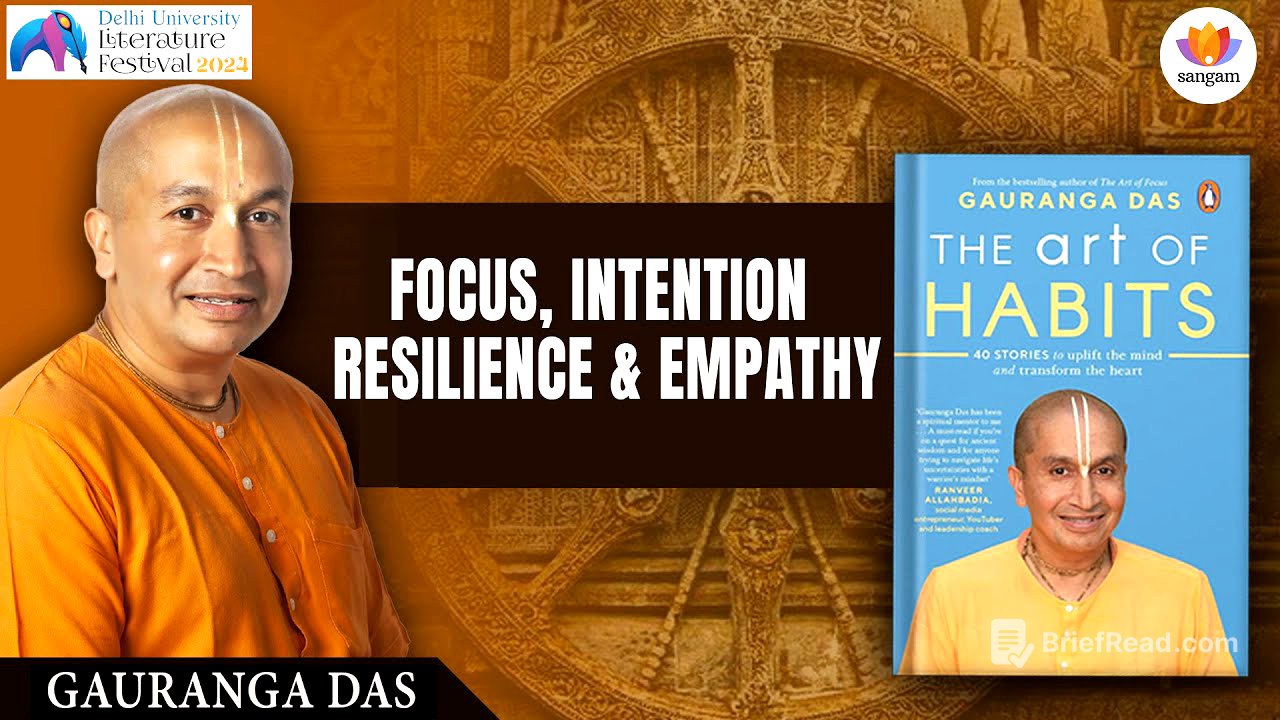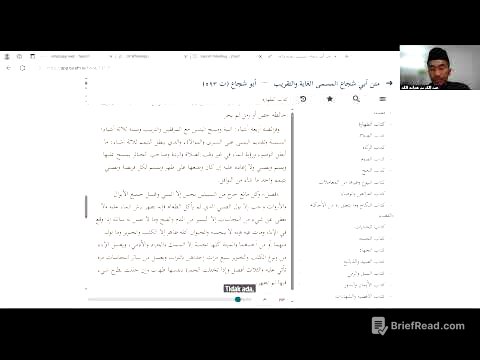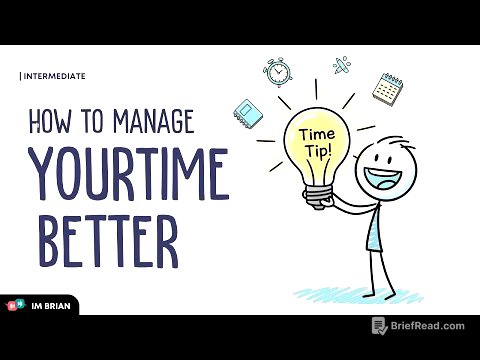TLDR;
This video explores the art of habit formation through four key principles: focus, intention, resilience, and empathy. It highlights the importance of aligning one's actions with meaningful intentions, cultivating mental resilience to overcome challenges, and fostering empathy to build strong relationships. The talk emphasizes that mastering these principles can lead to positive habits and a disciplined life.
- Focus on priorities to avoid distractions.
- Align intentions with duty and love over fear and desire.
- Build resilience to manage stress and maintain perspective.
- Cultivate empathy to foster forgiveness and strong relationships.
Introduction: The Gold Medal Suicide Attempt [0:00]
The speaker begins by recounting an incident from his time at IIT where a gold medalist attempted suicide after receiving a silver medal, illustrating the intense pressure and narrow definition of success prevalent in the education system. Conversely, he also describes friends who failed multiple subjects yet remained carefree, highlighting a contrasting philosophy. This contrast leads to a reflection on the difference between success and happiness.
Education vs Happiness: The IIT Revelation [2:23]
The speaker reflects on how the education system often prioritizes success over happiness. He defines success as getting what you like, while happiness is liking what you get, noting the significant difference between the two. This realization prompted him to explore the mystery of happiness, which he believes is the underlying motivation for forming habits. Habits are linked to the memory of previous pleasurable experiences, driving individuals to repeat those activities.
Success vs Happiness: Core Difference Explained [3:47]
The speaker defines habit as the memory of a previous experience of pleasure, which urges us to repeat that activity. He introduces four principles to control habits and choices: focus, intention, resilience, and empathy. These principles are essential for gaining control over one's habits and making conscious choices that lead to a fulfilling life.
Principle 1: Focus - Overcoming Distraction Culture [6:02]
The first principle, focus, is crucial for overcoming distractions. The speaker explains that a lack of focus stems from not knowing one's priorities and identity, leading to susceptibility to external influences like advertisements. He identifies comparing, complaining, and criticizing as "three cancers of the mind" that hinder focus. The speaker shares a story about a public speaking coach and a villager who misinterprets his advice, highlighting the danger of trying to be someone you're not.
The Public Speaking Disaster Story [8:53]
The speaker shares a story about a public speaking coach and a villager who misinterprets his advice, highlighting the danger of trying to be someone you're not. The villager attempts to replicate the coach's opening line but fails to remember the punchline, resulting in an embarrassing situation. This story illustrates the importance of authenticity and not trying to imitate others.
Bhima's Singing Ambition: Comparison Trap [10:32]
The speaker uses the example of Bhima from the Mahabharata, who, envious of Arjuna's musical talents, tries to become a singer despite lacking the aptitude. Bhima's attempts are comically unsuccessful, leading him to retire from singing. This story illustrates the importance of focusing on one's strengths rather than trying to imitate others. The speaker also shares an anecdote about a person with a "PhD BF" degree, highlighting the pressure to conform to social expectations.
Principle 2: Intention - Four Levels of Motivation [18:30]
The second principle is intention, which can be driven by four levels: fear, desire, duty, and love. Fear-based motivation involves acting to avoid negative consequences, while desire-based motivation is driven by personal gain, which can sometimes lead to greed. Duty-based intention arises from an internal sense of responsibility, and love-based intention involves selfless service to others. The speaker emphasizes the importance of aligning intentions with duty and love over fear and desire.
The Stockbroker Scam: Greed vs Wisdom [25:45]
The speaker illustrates the dangers of greed with a story about a stockbroker who gets caught in a scam. The stockbroker's wife acknowledges that while her husband was equally talented, he lacked the wise counsel that guided his friend, ultimately leading to his downfall. This story underscores the importance of ethical considerations and avoiding the lure of excessive wealth.
Principle 3: Resilience - Mental Strength Building [32:15]
The third principle is resilience, which is the ability to bounce back from adversity. The speaker warns against overconsumption of data from the internet, which can overwhelm the mind and reduce its resilience. He identifies lust, anger, and greed as forces that weaken the mind, making it vulnerable and susceptible. The speaker shares an anecdote from Yeravada jail, where he met a prisoner who committed multiple murders due to uncontrollable anger.
The Jail Lecture: Anger Management Lessons [38:20]
The speaker shares an experience from a lecture at MIT where the LCD projector malfunctioned, testing his ability to overcome anger. He also references Krishna's definition of stress as the gap between expectation and reality. The speaker emphasizes the importance of maintaining perspective and not magnifying problems, referencing his popular reel on overthinking. He shares a story about traveling to IIT Kharagpur during a Bengal bandh, highlighting the importance of resourcefulness and maintaining hope in difficult situations.
Principle 4: Empathy - Foundation of Relationships [42:20]
The fourth principle is empathy, which is essential for building strong relationships. The speaker emphasizes that without empathy, there is no forgiveness, no relationship, and no family. He shares a story about an American boy who came to India to experience family values, highlighting the importance of emotional connection and cultural preservation.
American Boy's Family Quest in India [46:30]
An American boy, seeking a family experience, moves to India and lives as a paying guest to understand family festivals, love, and communal eating. His father supported his quest, highlighting a desire for deeper family connections.
Conclusion: Mastering the Art of Habits [48:19]
In conclusion, the speaker thanks Sriram College and the Delhi Literature Festival for the invitation and underscores the importance of focus, intention, resilience, and empathy in transforming habits. He emphasizes that by working on these principles, positive habits will follow, leading to discipline and a fulfilling life. He concludes by stating that "forgiveness is to call off the war on reality."









